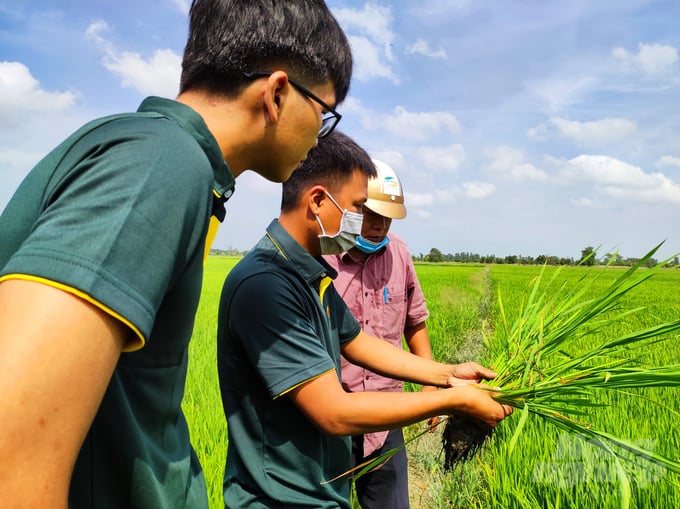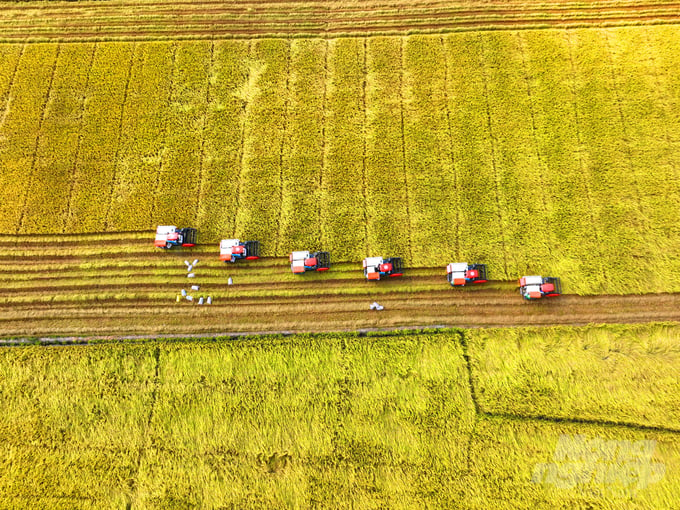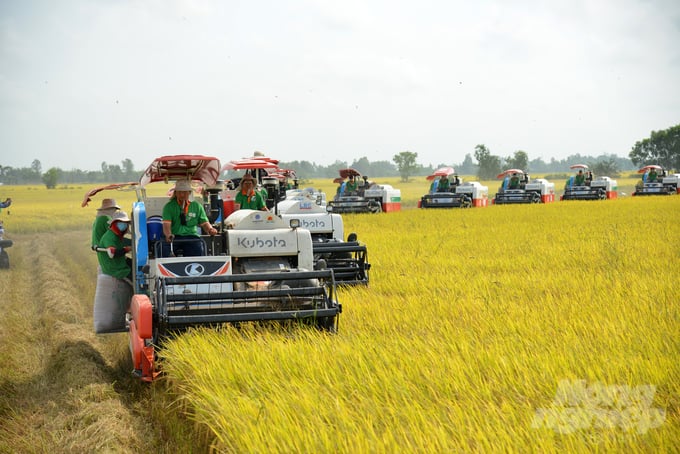June 21, 2025 | 03:40 GMT +7
June 21, 2025 | 03:40 GMT +7
Hotline: 0913.378.918
June 21, 2025 | 03:40 GMT +7
Hotline: 0913.378.918

Agricultural engineers from Thoai Son - An Giang rice area visits farmer’s field. Photo: Le Hoang Vu.
An Giang is one of the key provinces producing and exporting rice of the Mekong Delta. The province has also built a well-functioning rice production - consumption linkage. This is great encouragement which highly motivates investors. During the period 2021 - 2023, An Giang has 63 cooperatives, 2 cooperative unions and 180 cooperative groups conducting production and agro-product consumption alongside organizations and enterprises with a total production area of 300,000 ha. In particular, many cooperatives have members participating in management and administration.

Loc Troi provides a specialized drone service to handle crops in rice raw material areas, reducing costs and increasing the efficiency of pesticide usage. Photo: Le Hoang Vu.
A mentionable example is the hi-tech model “field without footprints”. It’s a safe rice production model which establishes production and consumption linkage. The model is first implemented in Binh Thanh Cooperative (Thoai Son district, An Giang). Loc Troi Group makes a commitment that rice farmers at least gain VND 40 million/ha/year in profit with underwritten output, so the model has been replicated in many Mekong Delta provinces.
“In the development plan of Loc Troi Group, the ‘field without footprints’ model carries out rice production associated with mechanization and synchronous application from the beginning to the end of the crop, saving the amount of seed used while reducing the amount of fertilizer and chemical pesticides, labor, production costs by 20-30% compared to traditional practices. The model serves as a good method to limit environmental pollution and better adapt to climate change,” said Nguyen Duy Thuan, CEO of Loc Troi Group.
According to Nguyen Thanh Than, Director of Thoai Son Cooperative Union, the cooperative union produces hundreds of ha of rice in each crop. Being associated with the Loc Troi 123 model, rice farmers are underwritten in terms of inputs and guaranteed an increase in profits. Loc Troi supplies seeds, Thoai Son Cooperative Union supplies agricultural inputs, offers purchases and other agricultural services. Therefore, for many consecutive years, Thoai Son Cooperative Union has operated very effectively, meaning farmers also have higher profits compared to normal production outside the model.
For farmers in cooperatives and cooperative groups associated with Loc Troi Group, Sustainable Rice Platform (SRP) standards are no longer an unfamiliar concept. However, for those who are too used to traditional farming, this toolkit to promote sustainable rice production practices seems a bit "confusing".
In order to help farmers see the benefits of SRP, Loc Troi Group and An Giang Agricultural Extension Center built a demonstration model in the rice field of farmer Le Van Phuoc (Tan Thuan hamlet, Ta Danh commune, Tri Ton district) in the recent winter-spring crop of 2023.
On an area of 2 ha, Phuoc used the OM18 rice variety (researched and developed by Loc Troi Group). He was supported in terms of seeds and fertilizers. He received training in the rice cultivation process "1 must, 5 decrease" with main technical contents such as soil preparation, fertilization, pest control, and recording field diary. Phuoc carried out the sparse sowing process with a density of 120 kg of seeds/ha and practiced using pesticides according to the "4 right" principle (right pesticide, right dosage, right time, right way).

Building production models along the value chain, promoting cooperative - cooperative union linkages allows farmers to facilitate the application of high technology, mechanization, optimizing the amount of pesticides in crop operations. Photo: Le Hoang Vu.
After 3 months of farming, the agricultural extension center organized a workshop to summarize the model with the participation of over 60 farmers and engineers from Ta Danh, Tan Tuyen, Co To, Nui To communes and Tri Ton town. Directly visiting the sustainable rice farming model according to SRP standards, farmers expressed great interest in seeing Phuoc's rice fields develop well while costs had been significantly reduced. Thanks to effectively lowering the amount of seeds sown, fertilizers and pesticides, irrigation water, the gained profits were VND 4 million/ha higher than the control field.
The International Rice Research Institute (IRRI) organized an "SRP Authorized Trainer" program for 16 personnel from the service industry and Loc Troi Agricultural Research Institute. This is an activity within Loc Troi Group's plan to acquire 100 professional SRP instructors and widely deploy SRP models in the near future. After completing this course, Loc Troi employees officially became SRP instructors, directly training farmers participating in the SRP 100 model.
This is the core force to deploy the 1 million ha of high-quality rice scheme proposed by the Ministry of Agriculture and Rural Development. Loc Troi Group is always ready to support the direction of sustainable agricultural development, minimizing impacts on the environment and ensuring livelihoods for farmers in Vietnam and the world.

For the past 3 - 4 years, Loc Troi Group’s ultimate goal has been to help rice farmers in the Mekong Delta further apply SRP standards, reflected by the deployment of the SRP 100 model in An Giang and Dong Thap provinces. Photo: Le Hoang Vu.
Aiming toward sustainable agricultural development, Loc Troi Group joined SRP in 2015. For the past 3 - 4 years, Loc Troi Group’s ultimate goal has been to help rice farmers in the Mekong Delta further apply SRP standards, reflected by the deployment of the SRP 100 model in An Giang and Dong Thap provinces. Thanks to the comprehensive support of Loc Troi Group, 13 farmers in the model have met 100% of SRP standards.
Translated by Samuel Pham
![Turning wind and rain into action: [9] Digitizing hydrometeorological data in response to climate change](https://t.ex-cdn.com/nongnghiepmoitruong.vn/608w/files/news/2025/06/17/z6704423696987_15fd32ffc26d590d204d520c9dac6786-nongnghiep-165943.jpg)
(VAN) Farmers have begun accessing hydrometeorological applications to adjust their cropping schedules, aiming to ensure productivity and adapt to climate change.
![Turning wind and rain into action: [8] Real-time salinity detection and early warning technology](https://t.ex-cdn.com/nongnghiepmoitruong.vn/608w/files/news/2025/06/17/z6704423696987_15fd32ffc26d590d204d520c9dac6786-nongnghiep-151127.jpg)
(VAN) Thanks to the integration of modern hydrological-hydraulic models, remote sensing technologies, and artificial intelligence, the accuracy of hydrological forecasting has significantly improved.
![Turning wind and rain into action: [7] Early disaster warnings help marine farmers minimize losses](https://t.ex-cdn.com/nongnghiepmoitruong.vn/608w/files/news/2025/06/17/z6704423696987_15fd32ffc26d590d204d520c9dac6786-nongnghiep-142942.jpg)
(VAN) In recent years, thanks to early disaster warnings and forecasting, marine farmers in Khanh Hoa province have been able to reduce risks and losses, thereby improving production efficiency.
![Turning wind and rain into action: [6] ‘Four on-the-spot’ disaster management software](https://t.ex-cdn.com/nongnghiepmoitruong.vn/608w/files/news/2025/06/17/e5a48259d6a262fc3bb3-nongnghiep-183800.jpg)
(VAN) By simply activating the scenario on the disaster management software, the relevant authorities immediately know how many households need to be evacuated, where to evacuate them to, and by what means of transportation…
![Turning wind and rain into action: [5] Hue applies modern technology in disaster forecasting](https://t.ex-cdn.com/nongnghiepmoitruong.vn/608w/files/news/2025/06/17/z6704423696987_15fd32ffc26d590d204d520c9dac6786-nongnghiep-093938.jpg)
(VAN) In Hue city, modern technology has recently been applied in meteorological and hydrological forecasting and warning, helping to reduce the damage caused by natural disasters.

(VAN) A cutting-edge farming technique being implemented on an experimental ranch in Arizona's Sonoran Desert has already saved a billion gallons of water over five years, according to Civil Eats.

(VAN) Poultry and pig production and the environment can be boosted through enhanced water technology, according to new research.